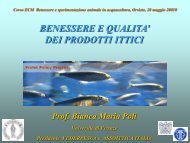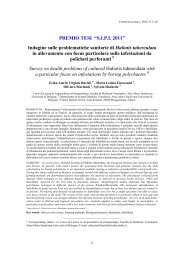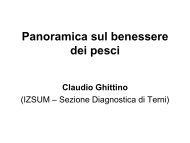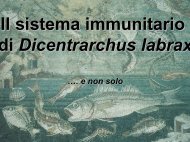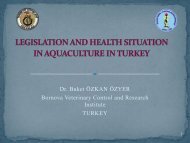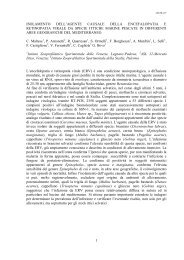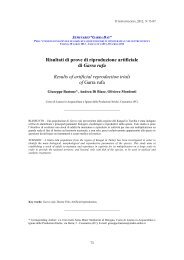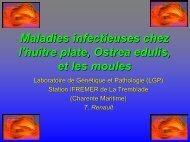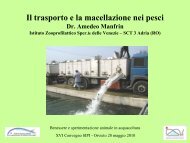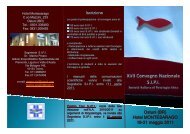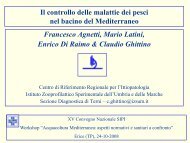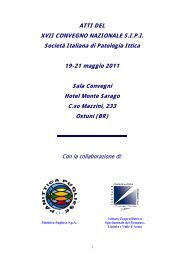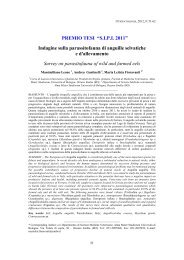ATTI DEL XV CONVEGNO NAZIONALE SIPI Società Italiana di ...
ATTI DEL XV CONVEGNO NAZIONALE SIPI Società Italiana di ...
ATTI DEL XV CONVEGNO NAZIONALE SIPI Società Italiana di ...
- No tags were found...
You also want an ePaper? Increase the reach of your titles
YUMPU automatically turns print PDFs into web optimized ePapers that Google loves.
Abstract Workshop<br />
THE ROLE OF OIE IN SETTING INTERNATIONAL STANDARDS FOR<br />
PREVENTING SPREAD OF AQUATIC ANIMAL DISEASES<br />
Barry HILL<br />
Vice-President, OIE Aquatic Health Standards Commission.<br />
The World Organisation for Animal Health (OIE) (www.oie.int) provides guidelines,<br />
through the Aquatic Animal Health Code, for preventing the international spread of aquatic<br />
animal <strong>di</strong>seases. The OIE provides the only standards recognised under the SPS<br />
Agreement of the World Trade Organisation for animal health con<strong>di</strong>tions applying to<br />
international trade in animals and animal products. The aim is to ensure the sanitary safety<br />
of international trade in live animals and their products. This is achieved by provi<strong>di</strong>ng<br />
guidelines on the health measures to be used by the veterinary authorities of importing and<br />
exporting countries to prevent the transfer of agents pathogenic for animals, while avoi<strong>di</strong>ng<br />
unjustified trade barriers.<br />
The development of guidelines for aquatic animals (fish, molluscs, crustaceans and<br />
amphibians) is the result of the continuous work of one of the OIE's Specialist<br />
Commissions, the OIE Aquatic Animal Health Standards Commission (“Aquatic Animals<br />
Commission”). The Aquatic Animals Commission is assisted by internationally renowned<br />
independent experts, OIE ad hoc groups and expertise at the many OIE Reference<br />
Laboratories for aquatic animal <strong>di</strong>seases. The main published standards produced by the<br />
OIE for aquatic animals are the Aquatic Animal Health Code (“Aquatic Code”) and the<br />
Manual of Diagnostic Tests for Aquatic Animals (“Aquatic Manual”). The views of OIE<br />
Member Countries are systematically sought through the circulation of draft and revised<br />
texts and other proposals appended to the Commission‟s meeting reports to the National<br />
Delegates of all OIE Member Countries. In ad<strong>di</strong>tion, the Aquatic Animals Commission<br />
collaborates closely with the OIE Terrestrial Animal Health Standards Commission on<br />
issues nee<strong>di</strong>ng a harmonised approach in the Terrestrial Code and the Aquatic Code, and<br />
meets with the OIE Biological Standards Commission and the OIE Scientific Commission<br />
to ensure consistency of scientific standards in the two Diagnostic Manuals.<br />
The Aquatic Animals Commission comprises five elected members experienced in the<br />
fields of methods for surveillance, <strong>di</strong>agnosis, control and prevention of infectious aquatic<br />
animal <strong>di</strong>sease and meets twice a year. The Commission also draws upon the expertise of<br />
internationally renowned experts to prepare draft texts for new chapters of the Aquatic<br />
Code and the Aquatic Manual or to revise existing chapters in light of advances in<br />
scientific knowledge. The Aquatic Manual provides a uniform approach to the <strong>di</strong>agnosis<br />
of, and surveillance for, the <strong>di</strong>seases listed in the Aquatic Code, so that the requirements<br />
for health certification in connection with international trade in aquatic animals and aquatic<br />
animal products can be met. The Aquatic Manual is continually revised and updated as<br />
new information on aquatic animal <strong>di</strong>seases in general, and new emerging <strong>di</strong>seases in<br />
particular, becomes available.<br />
The five members of the Aquatic Animals Commission are elected for a 3 year term by the<br />
International Committee of the OIE at the General Session in May of the election year. The<br />
OIE requires that the Commission members shall be internationally recognised specialists<br />
in the fields of methods for surveillance, <strong>di</strong>agnosis and prevention of infectious aquatic<br />
animal <strong>di</strong>seases and shall have extensive international experience, at the regional or global<br />
level. Key functions of the Commission are to:<br />
- propose the most appropriate methods for surveillance, <strong>di</strong>agnosis and <strong>di</strong>sease<br />
prevention for sanitary security of trade or international movement of aquatic animals<br />
and their products covering <strong>di</strong>seases listed in the Aquatic Code;<br />
62



